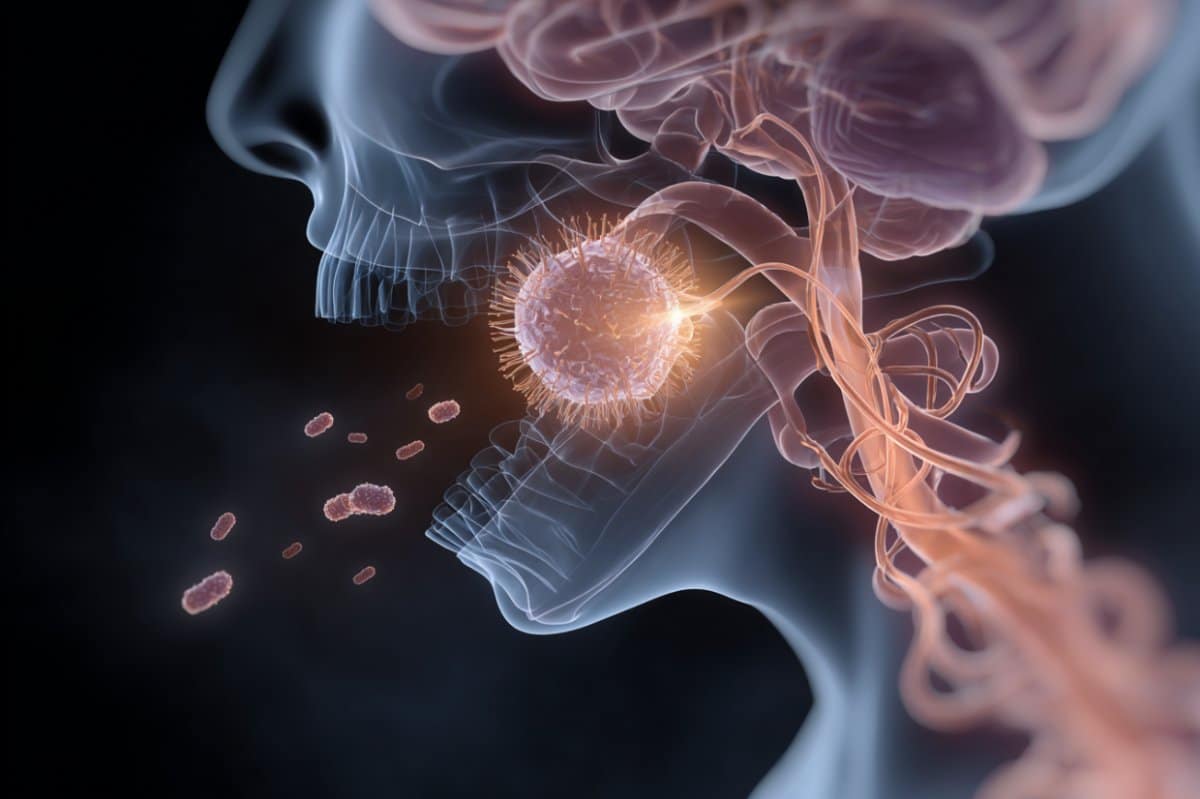Summary: Scientists have uncovered a direct link between oral bacteria and Parkinson’s disease. They found that Streptococcus mutans, best known for causing cavities, can settle in the gut and release metabolites that reach the brain.
These metabolites trigger neuronal loss, neuroinflammation, and motor impairments resembling Parkinson’s. The findings suggest that targeting the oral–gut microbiome could lead to novel strategies for preventing or treating the disease.
Key Facts
- Oral–Gut–Brain Link: Streptococcus mutans can migrate from mouth to gut and affect the brain.
- Toxic Metabolite: Its metabolite ImP damages dopaminergic neurons and promotes Parkinson’s pathology.
- Therapeutic Potential: Blocking mTORC1 signaling reduced neuroinflammation and motor symptoms in mice.
Source: POSTECH
There is now one more reason to brush your teeth thoroughly every day. Korean researchers have uncovered compelling evidence that oral bacteria, once colonized in the gut, can affect neurons in the brain and potentially trigger Parkinson’s disease.
The joint research team, led by Professor Ara Koh and doctoral candidate Hyunji Park of POSTECH’s Department of Life Sciences, together with Professor Yunjong Lee and doctoral candidate Jiwon Cheon of Sungkyunkwan University School of Medicine, collaborated with Professor Han-Joon Kim of Seoul National University College of Medicine.

They have identified the mechanism by which metabolites produced by oral bacteria in the gut may trigger the development of Parkinson’s disease.
The findings were published online on September 5 in Nature Communications.
Parkinson’s disease is a major neurological disorder characterized by tremors, stiffness, and slowed movement. It affects approximately 1-2% of the global population over the age of 65, making it one of the most common age-related brain diseases.
Although previous studies suggested that the gut microbiota of individuals with Parkinson’s differs from that of healthy individuals, the specific microbes and metabolites have remained unclear.
They found an increased abundance of Streptococcus mutans—a well-known oral bacterium that causes dental caries—in the gut microbiome of Parkinson’s patients.
More importantly, S. mutans produces the enzyme urocanate reductase (UrdA) and its metabolite imidazole propionate (ImP), both of which were present at elevated levels in the gut and blood of patients. ImP appeared capable of entering systemic circulation, reaching the brain, and contributing to the loss of dopaminergic neurons.
Using mouse models, the researchers introduced S. mutans into the gut or engineered E. coli to express UrdA. As a result, the mice showed elevated ImP levels in blood and brain tissue, along with the hallmark features of Parkinson’s symptoms: loss of dopaminergic neurons, heightened neuroinflammation, impaired motor function, and increased aggregation of alpha-synuclein, a protein central to disease progression.
Further experiments demonstrated that these effects depend on the activation of the signaling protein complex mTORC1. Treating mice with an mTORC1 inhibitor significantly reduced neuroinflammation, neuronal loss, and alpha-synuclein aggregation, and motor dysfunction.
This suggests that targeting the oral–gut microbiome and its metabolites may offer new therapeutic strategies for Parkinson’s disease.
“Our study provides a mechanistic understanding of how oral microbes in the gut can influence the brain and contribute to the development of Parkinson’s disease,” said Professor Ara Koh.
“It highlights the potential of targeting the gut microbiota as a therapeutic strategy, offering a new direction for Parkinson’s treatment.”
Funding: The research was supported by the Samsung Research Funding & Incubation Center of Samsung Electronics, the Mid-Career Researcher Program of the Ministry of Science and ICT, the Microbiome Core Research Support Center, and the Biomedical Technology Development Program.
About this Parkinsons’s disease research news
Author: Yung-Eui Kang
Source: POSTECH
Contact: Yung-Eui Kang – POSTECH
Image: The image is credited to Neuroscience News
Original Research: Open access.
“Gut microbial production of imidazole propionate drives Parkinson’s pathologies” by Ara Koh et al. Nature Communications
Abstract
Gut microbial production of imidazole propionate drives Parkinson’s pathologies
Parkinson’s disease (PD) is characterized by the selective degeneration of midbrain dopaminergic neurons and aggregation of α-synuclein. Emerging evidence implicates the gut microbiome in PD, with microbial metabolites proposed as potential pathological mediators.
However, the specific microbes and metabolites involved, and whether gut-derived metabolites can reach the brain to directly induce neurodegeneration, remain unclear.
Here we show that elevated levels of Streptococcus mutans (S. mutans) and its enzyme urocanate reductase (UrdA), which produces imidazole propionate (ImP), in the gut microbiome of patients with PD, along with increased plasma ImP.
Colonization of mice with S. mutans harboring UrdA or Escherichia coli expressing UrdA from S. mutans increases systemic and brain ImP levels, inducing PD-like symptoms including dopaminergic neuronal loss, astrogliosis, microgliosis, and motor impairment.
Additionally, S. mutans exacerbates α-synuclein pathology in a mouse model. ImP administration alone recapitulates key PD features, supporting the UrdA–ImP axis as a microbial driver of PD pathology. Mechanistically, mTORC1 activation is crucial for both S. mutans– and ImP-induced PD pathology.
Together, these findings identify microbial ImP, produced via UrdA, as a direct pathological mediator of the gut-brain axis in PD.
Source link

